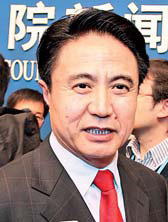Society
Ecology lifeline of Hainan: Governor
By Zhao Huanxin and Wang Hao (China Daily)
Updated: 2010-03-22 08:04
 |
Large Medium Small |
HAIKOU - No place in China has hogged more of the limelight than Hainan since the dawn of the year, when the central government unveiled a national strategy of developing the southernmost province into a world-class tourism destination in a decade.
 Luo Baoming, governor of Hainan, says the island will become a top tourism center. |
The core message he delivers to visitors is that ecological protection is the lifeline for expansion of the island's tourism, and Hainan is way off from the goal of becoming "a top international tourist destination", Luo told China Daily.
Thousands of holiday-makers swarmed to Hainan, especially the resort town
of Sanya, for the week-long Spring Festival last month. While taken in by the clean beaches and pollution-free air, some ended up complaining about poor service and unreasonably high hotel rates.
"I have been following the many comments and criticisms about Hainan," Luo said.
"We've stepped up supervision on the exorbitantly high hotel rates. The Spring Festival travel should never become 'the first and also the last deal' of the year, and we cannot count on revenues from the week-long holiday to sustain our business operations for the whole year.
| ||||
Burkhard Eiswaldt, general manger of International Culture and Art Co Berlin-Hainan, said: "If Hainan now writes the headline 'International Tourism Island' on its door, it also has to face the fact that other countries, tourists and business people will expect big things from Hainan - words are not enough."
Luo said the island will fix the woes in the tourism market by borrowing experience and expertise from regions where tourism is more entrenched. He also said Hainan will draw in more high-caliber talents, and intensify training to upgrade service levels.
Tourism in Hainan, already blessed with abundant natural resources, will be spiced up with lottery and gaming options, duty-free shopping and more visa-free procedures, according to guidelines the State Council, or China's Cabinet, issued on Jan 4.
Above all, the guidelines stipulate that services, predominated by tourism, should contribute at least 60 percent to Hainan's wealth by 2020, a sign that the country is seeking to optimize its economic structure and shift to a development mode that spurs and caters to domestic demand and a "green economy".
The central government also expects the island to set an example in ecological protection for the rest of the country.
Luo said that for Hainan's dreams to come true, preserving its ecology is a paramount precondition.
"Ecology is the lifeline of Hainan, all our advantages are built on Hainan's uniquely beautiful ecology and environment," he said. "The success of Hainan's endeavors largely hinges on how it preserves the ecology."
With nearly 60 percent of its 34,000 sq km - roughly 1/350 of China's total land area - covered by forest, Hainan boasts the country's best environment, atmosphere and water quality in lakes and along the coastline, Luo said.
But as an island, its ecological system is fragile and vulnerable to destruction from reckless development, he said.
"Hainan belongs to its inhabitants, to people from other parts of China, and to people of the whole world, so every resident, traveler and investor alike should help preserve the ecology and environment in the island," the governor said.
To protect Hainan's coastline of more than 1,500 km that contains numerous bays and natural harbors, the province planted strips of trees on 10,500 hectares between 2007 and 2009.
This has helped fortify the protective coastal forests, according to Luo.
He said the province has focused on clean solutions by developing solar power, windmills, bio-fuels and nuclear plants. As a result, clean energy constitutes one-third of its primary energy mix, among the highest in China.
To fulfill its commitment to saving energy and reducing greenhouse gas emissions, Hainan will accelerate development of renewable energy resources so that the use of clean energy will steadily increase. It will also popularize "clean" coal solutions to reduce pollution, he said.
"We will have a 'green pass' to facilitate investment projects with low-carbon technologies," he said. "We also welcome partners to join us in developing ocean industries."
To illustrate how big the "green" market in Hainan is, Eiswaldt, a German executive who came to the island 20 years ago, said: "There is virtually not even one example of energy-efficient buildings on Hainan, which also will be a big market in the future. Also the recycling industry offers big profits, but it has not been developed."
Luo said the local government will lift a ban on commercial land leasing and real estate development later this month, when a detailed program on how to turn Hainan into an international tourist resort is approved by the country's top planner.
The ban was put in place on Jan 15, after the announcement of the international tourism destination concept pushed property prices skywards.
"But even during this period of 'land freeze', we have not stopped development of affordable housing," Luo said. "It is a top priority for the government to ensure that the 8.6 million inhabitants of the island have adequate housing."
Zhai Shengting, 69, who often dances at the Wanluyuan Park in downtown Haikou, capital of Hainan, seemed to have already realized his dream.
A retired businessman from Datong of North China's Shanxi province, Zhai bought an apartment in Haikou in 2005, and since then has spent six months in Hainan each year.
"All I want now is health and pleasure, both of which I've found in Hainan," he said.











